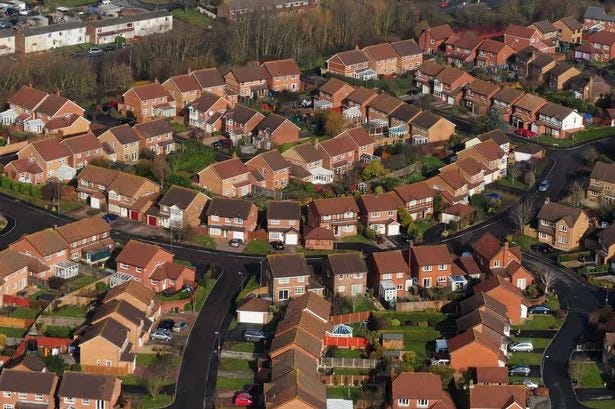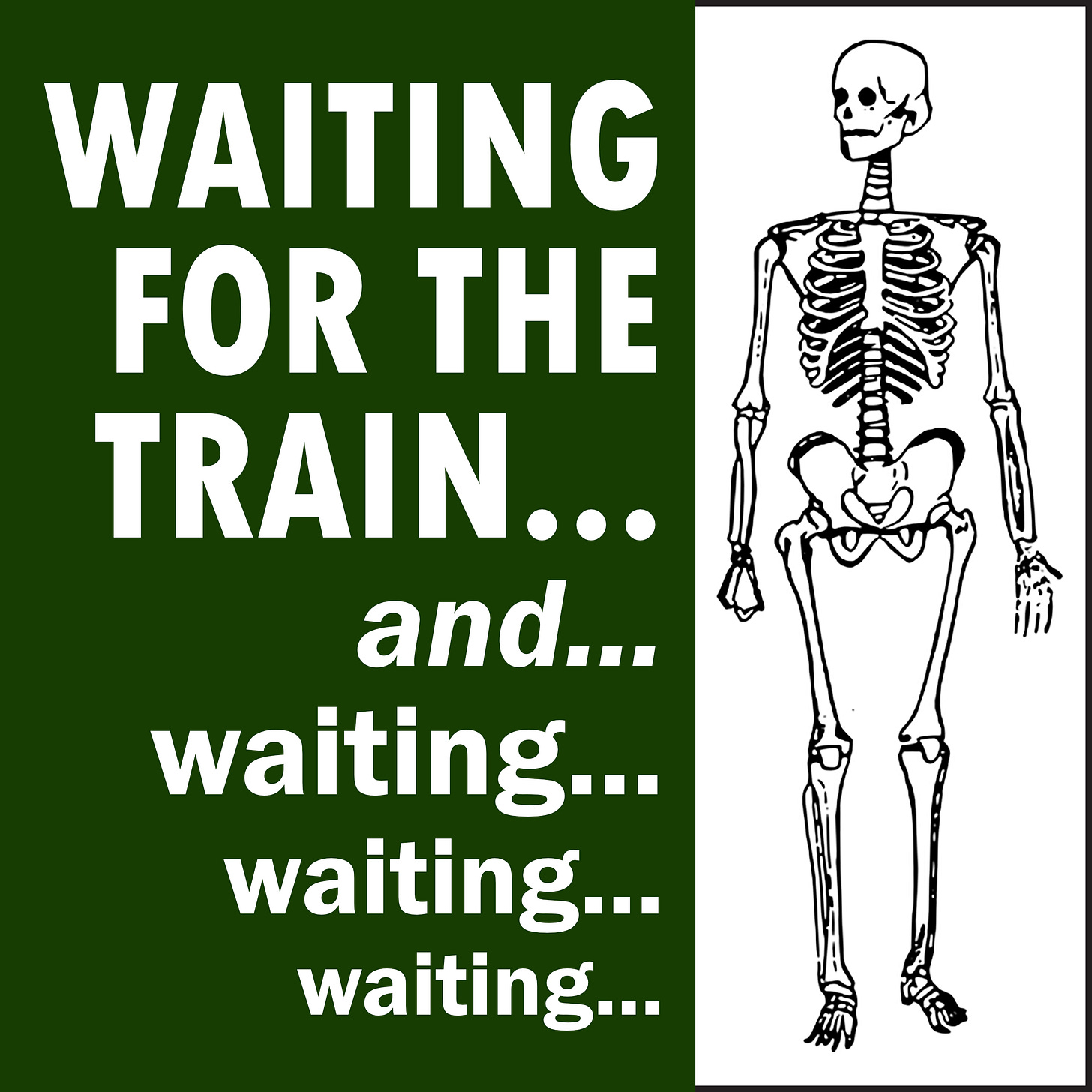I can't help noticing that here in Avon, the supporters of 'liveable neighbourhoods' and the concept of fifteen minute cities are doubling down in their fanaticism. I've put quote marks around 'liveable neighbourhoods' because what may well end up as 'liveable' for some will result in extra misery for others as the same volume of traffic using the roads is squeezed into a smaller amount of road space. I've lost count of the number of times where I've had to state that a 'liveable neighbourhood' can only be feasible in the context of a regional transport strategy that sets out to reduce the overall volume of traffic on the road network by offering an attractive and reliable public transport option. One that in the Avon region has to include an enhanced rail service and at some point, where feasible, light rail as well.
I've also lost count of the number of times I've had to state that a planning system which for decades was been based on the assumption of near universal car ownership has left us with an urban and suburban landscape where all too often, driving is a necessity, not just a lifestyle option. A system that has left us with sprawling suburbs where car ownership is a must because a lot of life's amenities are not within easy walking distance and the public transport offering leaves a lot to be desired.
Recently, we went along to a public consultation event for the Bath & North East Somerset (BANES) Local Plan. I talked to a couple of people from the authority who had responsibility for transport and even though they're doing what they can to promote 'active travel', it's inevitable that most of the new housing being planned is going to lead to an increase in road traffic. Particularly if the new settlement in the open countryside to the west of Bath is given the go ahead. What doesn't help matters is that responsibility for public transport planning and provision is not the responsibility of BANES, it's the remit of the West of England Combined Authority who to put it politely, are dysfunctional! So, until there's a major reform of planning policy and a boost to public transport provision, it will remain the case that most people are going to have to drive in order to lead their lives. We are where we are with this one...
On top of this, there seems to be little effort being made by the supporters of liveable neighbourhoods and fifteen minute cities to understand why people feel they have no other option than to drive. You could be forgiven for thinking that these supporters think all car drivers are selfish petrol heads who deserve nothing more than to be cajoled and harassed into giving up their vehicles. Also, it's hard to escape the impression that a good number of these supporters are cycling fanatics who seem to think that all of us can jump onto a bicycle for a lot of our local travel needs.
If you're disabled and have limited mobility, being able to drive is a vital lifeline. Anything that frustrates the ability of someone who's disabled to move around by vehicle is an act of wanton cruelty. For anyone who relies on a visiting carer for their needs, it's vital that carers can move around unimpeded. To have to make lengthy diversions because of the implementation of a liveable neighbourhood means fewer calls can be made or visits have to be shorter. Either way, the carer will struggle to provide the service they want to provide and care receivers will be the ones who suffer.
Then there are the trades who need their vans to transport their tools and materials around. The suggestion that they could use a cargo bike to transport these around is laughable. When we were having work done on the flat we live in, talking to the trades who turned up, it was abundantly clear that they cover a large area and that reaching the jobs they had to attend definitely requires a van, not a cargo bike. If the supporters of liveable neighbourhoods and fifteen minute cities actually tried hauling round all the gear needed for a house painting job on a cargo bike, taking in the hills they will inevitably encounter, they might change their minds. That's assuming that a) they would contemplate undertaking skilled manual work and b) they have the empathy and understanding to appreciate someone else's perspective on life.
As I've written previously, it's volunteers who keep grassroots initiatives going. More often than not, they'll need to drive in order to fulfil their roles. That can be anything from delivering and collecting the football kits for a kid's match to transporting all the gear needed for stalls at a community event. Anything that increases journey times and causes more hassle may well end up with a steady stream of volunteers deciding to call it a day. If that happens, then the bonds that keep our communities together will be further eroded.
Last but by no means least, there's the aforementioned legacy of decades of planning policy based on the assumption of universal car ownership. This leaves many of us living in tract suburban housing where driving is a necessity just for the basics of life such as shopping, let alone anything else. These are places that with the best will in the world, will never become fifteen minute neighbourhoods, because shops and other amenities are spread so far apart from each other.
There are other examples I could cite, but hopefully, you're starting to get the picture. What really gets me is the seeming refusal of the supporters of liveable neighbourhoods and fifteen minute cities to make the effort to understand why many people feel they have no other option than to drive. There's no room for nuance, grey areas and actually listening to people's real life experiences. When that happens, it leads to a polarisation that sets back any chance of a meaningful dialogue. What we have instead is yet another pointless culture war that pretty much eliminates any chance of coming up with a genuinely sustainable solution.
At this point, I'd like to point out that the two of us behind this project don't drive. As we don't drive we have a lot of first hand experience of just how hard it is to get around the Avon region when we have to rely on trains, buses and walking. This is why we're passionate about fighting for better public transport provision. It's also why we're obsessed with pointing out the numerous shortcomings of the pedestrian infrastructure in the Avon region.
When we moved down here from Essex in 2022, our criteria for finding somewhere we'd want to live were ease of access to a decent range of shops and obviously, public transport. The bonus was ease of access to a decent local park and open countryside. Even though Keynsham where we live is a small town, those criteria only applied to about a quarter of it. Luckily, we found somewhere that fitted our criteria but, the downside is we're living right next to the sodding bypass! If any of the supporters of liveable neighbourhoods and fifteen minute cities are reading this, hopefully they'll realise that as non-drivers, we're not petrol heads and that we do have legitimate questions to ask about these initiatives and concepts. That's assuming they've got this far...
I hope that having got to this point, you'll see that we're trying our level best to take a nuanced position on the contentious issues surrounding liveable neighbourhoods and fifteen minute cities. If that's not enough, there's an ever growing list of pieces we've published around these issues and more that you can read through at your leisure: Posts on movement. We're putting it on record always up for an honest, open dialogue on the issues surrounding liveable neighbourhoods and fifteen minute cities. However, given the smearing and insults coming from at least some of the supporters of these initiatives, I honestly don't think there's much chance of that happening.
As you can see from the above, this is what those of us making legitimate criticisms of liveable neighbourhoods and fifteen minute cities have to contend with. For many of the supporters of liveable neighbourhoods and fifteen minute cities, there are no nuances, no grey areas and by their actions in posting stuff like this, no room for any meaningful dialogue. If they're so sure they're in the right, why don't they engage in debate and defend their views rather than resort to baseless smears and insults?
To conclude, we didn't set out to start yet another pointless culture war but these f**kers with their naïve black and white view of the world and their condemnation of anyone raising legitimate concerns have taken it upon themselves to spark one off. There really is so much shite people can take and, we've had more than our fair share at this point...











I started trying to do what you're describing - have a reasoned discussion of these policies, based on pointing out real consequences and implications - on social media over a year ago and since then have written extensively on the subject for national and independent media. All I ever get from the advocates are denial, assertions of the kind you describe and, more recently, insults.
The phenomenon we're dealing with is much more than people just not listening, it's to do the grip that ideology has once it takes hold - a complex issue best understood in social psychology and the history books! In Britain 2024 it's perhaps most clearly observable in Streatham, a few miles from where I live. The Streatham Wells LTN is causing extraordinary levels of disruption and distress. Footage of queues of buses are posted on social media daily and when I went to see for myself last week I found the pavement full of crowds waiting for buses. There are multiple campaigns and calls for Lambeth Council (and the Department of Transport) to do something but they are falling on deaf ears. And still the citizen advocates cry 'it's working'.
I hear the same thing playing out in Bath, where the council is planning around 40 LTNs and Oxford, where the permit-and-zone scheme will start in the autumn. To whit it's worth mentioning that the idea LTNS is that they should cover an entire city or borough - mayor Rees has explicitly said that for Bristol - and this kind of restriction of public mobility has not been tried in a western society before.
More and more people are starting to see this is not a solution to traffic congestion and not intended to be one (another long story if you start to follow the funding and organisations behind these policies). But it may be that things have to go really far in Bath, Oxford and areas of London before the penny really drops with the locals.
The constant complaint by those who believe our councils are doing us a favour by introducing these schemes that people who object don't live in the area is so short-sighted. As Alex mentions above the plan for Bristol is to introduce them everywhere, at the rate of two a year, which means everyone will be affected in the end. And many people driving from A to B will already be affected by just one LTN. And just as importantly, it's clear that many residents of Barton Hill, St George etc ARE objecting to them, and have not been listened to so far.
I'm aware that a lot of objections were submitted during the council's recent short (three week) online statutory consultation on the East Bristol "Liveable Neighbourhood" and it will be interesting to see if they are just swept under the carpet. My understanding is that this could get them into legal difficulties, but we'll see!
I pesonally attempted to contact one of the most vocal supporters of the scheme - the author of the "implement EBLN" petition on the council website. I received no reply. It really doesn't look great if they are so fanatical about their agenda that they refuse to enter into conversation about it and show no curiosity about different points of view